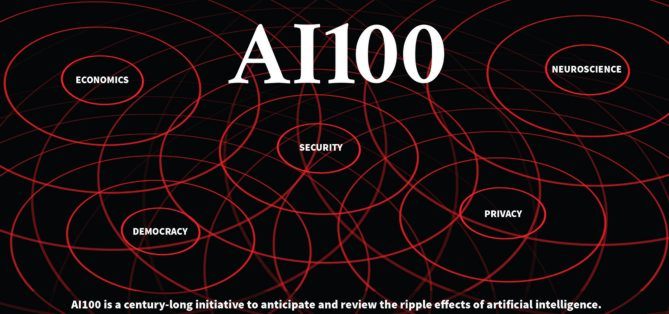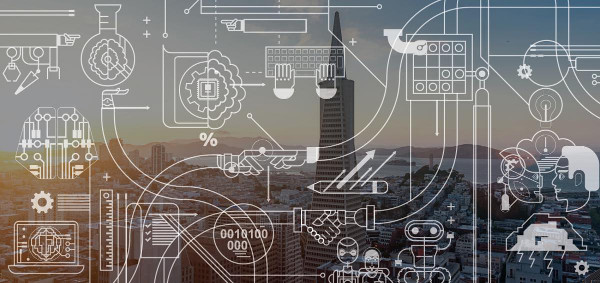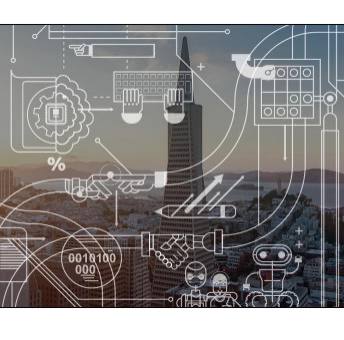| How Will AI Transform Life By 2030? Initial Report |
| Written by Nikos Vaggalis |
| Monday, 26 September 2016 |
|
The panel of experts tackling "The One-Hundred Year Study of Artificial Intelligence" attempts to address this question in an in-depth report that reviews the advancements and benefits as well as challenges that this technology heralds. This is the very first in a series of reports set to be published annually. It consists of 27 double-sided pages with a two-column format. As such, its size and presentation can put potential readers off, so we prepared a summary of the most important points interspersed with our own experience on the matter.
The "One-Hundred Year" study group was established in 2014 and for more on its background see The Effects Of AI - Stanford 100 Year Study. It founded with one purpose in mind - to be the board that perceptually monitors and assesses the socio-economic implications AI will have on eight major aspects pertaining to a typical North US city citizen's life: transportation; domestic service; healthcare; education; aid for low-resource communities; public safety and security; employment and workplace; and entertainment. But first of all, why does the report target a typical North US city and why by year 2030? Because such a city is a prime sample of the great variability of urban settings and cultures found in modern day cities, and because predictions foresee AI's advancements having the most impact on our society between the present and 2030. AI's application to the inner city life doesn't come without challenges however. Reliability, safety, fluent interaction with humans and the gaining of public trust are just a few, but the most hotly debated and one of outermost importance is none other than the fear of marginalizing humans in employment and workplace, an era of mass unemployment and social upheaval. To these fears, founded or not, the committee responds by pointing out that it's not in the machine's interest to marginalize or harm people, but the people and their policies are the ones who do. Therefore policy decisions made in the near term will play an outermost role in steering the public's opinion towards positivity or negativity regarding AI, which most likely will have long-lasting influences in shaping the landscape that future generations will find themselves in. With that in mind the report ponders: Who is responsible when a self-driven car crashes or an intelligent medical device fails? How can AI applications be prevented from promulgating racial discrimination or financial cheating? Who should reap the gains of efficiencies enabled by AI technologies and what protections should be afforded to people whose skills are rendered obsolete? As people integrate AI more broadly and deeply into industrial processes and consumer products, best practices need to be spread, and regulatory regimes adapted.
It's also of interest to look into why the field of AI has especially blossomed in the last few years or so. Better and cheaper hardware is reason one. Reason two is the large-scale machine learning that was made possible due the abundance in data accumulating online, both from mobile and IoT devices alike, data that under the guidance of Reinforcement Learning was used in training the very algorithms that make AI a reality. Reinforcement Learning and IoT aside, Deep learning, Robotics, Computer Vision, Natural Language Processing,Collaborative systems, Crowdsourcing and human computation, Algorithmic game theory and Neuromorphic Computing are some further AI branches that underwent a lot of research and the report brings forward. The report then looks into the realizations of that research and the way they influence each one of the eight domains under investigation: Transportation Furthermore, as [autonomous vehichles] become better drivers than people, city-dwellers will own fewer cars, live further from work, and spend time differently, leading to an entirely new urban organization
Home/Service Robots However, the report finds that over the next fifteen years, coincident advances in mechanical and AI technologies promise to increase the safe and reliable use and utility of home robots in a typical North American city. Special purpose robots will deliver packages, clean offices, and enhance security, but technical constraints and the high costs of reliable mechanical devices will continue to limit commercial opportunities to narrowly defined applications for the foreseeable future
Healthcare Looking ahead to the next fifteen years, AI advances, if coupled with sufficient data and well-targeted systems, promise to change the cognitive tasks assigned to human clinicians. Physicians now routinely solicit verbal descriptions of symptoms from presenting patients and, in their heads, correlate patterns against the clinical presentation of known diseases. With automated assistance, the physician could instead supervise this process, applying her or his experience and intuition to guide the input process and to evaluate the output of the machine intelligence.
Education In the future, though quality education will always require active engagement by human teachers, AI promises to enhance education at all levels, especially by providing personalization at scale New forms of education powered by AI, are also expected to play a crucial role in re-training those displaced by the machines workers.
Low resource communities
Similarly, the Illinois Department of Human Services (IDHS) uses predictive models to identify pregnant women at risk for adverse birth outcomes in order to maximize the impact of prenatal care.
Public safety and security As AI for this domain improves, it will better assist crime prevention and prosecution through greater accuracy of event classification and efficient automatic processing of video to detect anomalies—including, potentially, evidence of police malpractice. These improvements could lead to even more widespread surveillance. Some cities have already added drones for surveillance purposes, and police use of drones to maintain security of ports, airports, coastal areas, waterways, industrial facilities is likely to increase, raising concerns about privacy, safety, and other issues.
Employment and workplace
These changes will require a political, rather than a purely economic, response concerning what kind of social safety nets should be in place to protect people from large, structural shifts in the economy.
Therefore, the improvements that AI will herald for this sector will play an outermost role in keeping the currently unemployed as well the expected to be displaced workforce, pleased and busy in order to avoid the socio-economic repercussions arising from the great unemployment. To date, the information revolution has mostly unfolded in software. However, with the growing availability of cheaper sensors and devices, greater innovation in the hardware used in entertainment systems is expected. Virtual reality and haptics could enter our living rooms—personalized companion robots are already being developed. With the accompanying improvements in Automatic Speech Recognition, the Study Panel expects that interaction with robots and other entertainment systems will become dialogue-based, perhaps constrained at the start, but progressively more human-like. Equally, the interacting systems are predicted to develop new characteristics such as emotion, empathy, and adaptation to environmental rhythms such as time of day
The report based on that insight into the future, proposes a number of recommendations that public policy should take into consideration in respect to AI's adoption: 1.Define a path toward accruing technical expertise in AI at all levels of government. Effective governance requires more experts who understand and can analyze the interactions between AI technologies, programmatic objectives, and overall societal values. 2.Remove the perceived and actual impediments to research on the fairness, security, privacy, and social impacts of AI systems. 3. Increase public and private funding for interdisciplinary studies of the societal impacts of AI. and raises a number of legal considerations in the contexts of Privacy, Innovation policy, civil and criminal Liability, Labor and Taxation. But the wisdom that accurately reflects reality is captured and compacted in just a few of the the final lines of the report: Like other technologies, AI has the potential to be used for good or nefarious purposes. Policies should be evaluated as to whether they democratically foster the development and equitable sharing of AI’s benefits, or concentrate power and benefits in the hands of a fortunate few. In other words, making or breaking it all, depends on all us humans, not the machines. More InformationOne Hundred Year Study on Artificial Intelligence (AI100) The Free-Time Paradox in America Related ArticlesThe Effects Of AI - Stanford 100 Year Study The AIX Minecraft Project Makes Thinking Software Possible Lucida For Personal Artificial Intelligence Artificial Intelligence in Pokémons' Service Achieving Autonomous AI Is Closer Than We Think Neural Networks for Storytelling Atlas Robot - The Next Generation OpenFace - Face Recognition For All To be informed about new articles on I Programmer, sign up for our weekly newsletter,subscribe to the RSS feed and follow us on, Twitter, Facebook, Google+ or Linkedin.
Comments
or email your comment to: comments@i-programmer.info |
| Last Updated ( Monday, 26 September 2016 ) |





